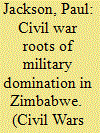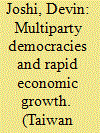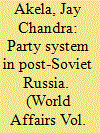| Srl | Item |
| 1 |
ID:
109230


|
|
|
|
|
| Publication |
2011.
|
| Summary/Abstract |
This article addresses the issue of what happens after a civil war ends. In particular it traces the development of political authoritarianism from an initial multiparty democracy and military integration following a civil war to one-party control and the breakdown of civil security following the rise of an alternative opposition. The post-conflict situation within Zimbabwe shows clearly how one faction was able to use their position to dismantle and incorporate opposition groups into a one-party state, despite considerable violence between former allies over seven years. A narrative history of the process and its aftermath provides a valuable insight into how these processes developed and the implications of actions taken during an integration process itself for subsequent political development.
|
|
|
|
|
|
|
|
|
|
|
|
|
|
|
|
| 2 |
ID:
138419


|
|
|
|
|
| Summary/Abstract |
A credible opposition is necessary for democratic accountability. However, in a multiparty democracy, a credible opposition may fail to emerge when it is in the strategic interest of political parties to collude rather than compete, effectively extinguishing all credible opposition. The author argues that illicit collusion among parties on a representative council is more likely when all viable parties win seats and are thus able to enter into a self-binding commitment to jointly engage in misconduct without risk of exposure. Conversely, when at least one party fails to win representation on the council, there is a credible opposition with the incentive and ability to threaten exposure of rent seeking among council members. The theory is tested using a regression discontinuity design where the electoral threshold to win a single seat is, within a narrow band, an exogenous determinant of whether or not there is an out-party or credible opposition. Exploiting the fact that Mali's decentralization produces within-country variation in both electoral and governance outcomes, the author uses data from commune council elections alongside local-level public goods provision as a measure of rent seeking. Poorer public goods provision is indeed more likely when all political parties in a district win seats on the council. To show that collusion is the mechanism driving this relationship, the author tests several observable implications in the data and uses qualitative evidence as illustration. This examination of when it is in the strategic interest of parties to engage in uncompetitive behavior contributes to the literature on when elections fail to produce democratic accountability.
|
|
|
|
|
|
|
|
|
|
|
|
|
|
|
|
| 3 |
ID:
107443


|
|
|
|
|
| Publication |
2011.
|
| Summary/Abstract |
This essay examines whether developing countries with competitive multiparty
democracies may be just as capable of sustaining rapid economic growth
as single-party states. It begins with a literature review identifying political
stability and the ability to mobilize labor and capital production inputs as key
factors behind sustained rapid growth. It then develops the hypothesis that under
certain conditions, multiparty democracies may be strong in these dimensions,
but ceteris paribus, single-party states are likely to have an advantage. I test
this hypothesis by exploring historical trends in rapid growth over the last five
decades. Statistical regression analysis confirms that most sustained highgrowth regimes have not been competitive multiparty democracies. On a more
optimistic note, however, the number of high-growth multiparty democracies
increased significantly during the period between 2000 and 2009, signaling a
possible breakthrough in the twenty-first century.
|
|
|
|
|
|
|
|
|
|
|
|
|
|
|
|
| 4 |
ID:
154254


|
|
|
|
|
| Summary/Abstract |
This article describes the principles and features of the party based political system in Russia and analyses the historical process that transformed the country from a single party polity within the Soviet Union into a multiparty democracy. It shows that the last decade of the twentieth century—marked by a proliferation of parties, a fragmentation of society, social decline and political paralysis—was succeeded from 2001 by the ongoing period of the concentration of power in the hegemonic party United Russia led by Vladimir Putin. This socially conservative but economically liberal and reformist party aims to build a middle class capable of supporting a stable democracy.
|
|
|
|
|
|
|
|
|
|
|
|
|
|
|
|